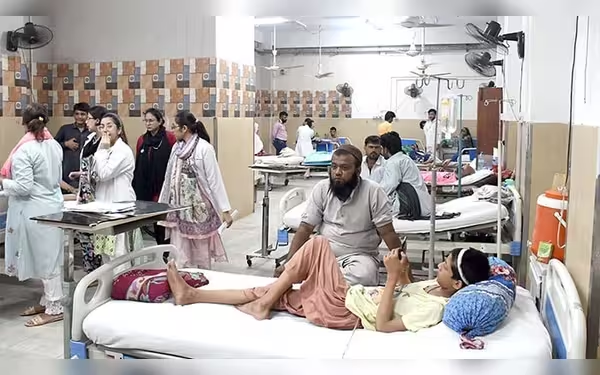Saturday, November 16, 2024 07:25 PM
Pakistan Confirms First MERS-CoV Patient Was Not Infected
- Patient tested negative for MERS-CoV after hospitalization.
- Muhammad Ameen recovered from a different viral infection.
- 40 family members tested following initial health concerns.
 Image Credits: geo
Image Credits: geoPakistan's first suspected MERS-CoV patient was confirmed to have a different viral infection and has since recovered.
In recent weeks, there has been considerable concern regarding a patient in Pakistan who was believed to have contracted the Middle East Respiratory Syndrome-Coronavirus (MERS-CoV). This viral infection, first identified in 2012, has raised alarms globally due to its severe nature and high mortality rate. However, the situation has taken a turn as officials have confirmed that the patient was not suffering from MERS-CoV but rather from a different viral infection.
The patient, identified as Muhammad Ameen, a 55-year-old resident of Kharian, had returned from a Middle Eastern country about a month prior to his hospitalization. Upon his admission to Benazir Bhutto Hospital (BBH) in Rawalpindi on September 5, he was placed in the Intensive Care Unit (ICU) and kept in isolation due to the initial suspicion of MERS-CoV. Medical Superintendent Dr. Tahir Rizvi stated that tests for MERS-CoV returned negative, and Ameen has since been discharged after recovering from his illness.
It is important to note that MERS-CoV is a serious viral respiratory illness that has been reported in 27 countries and has a mortality rate of approximately 36%. This high rate is often attributed to the underreporting of mild cases, which can lead to a misunderstanding of the virus's true impact. Symptoms of MERS-CoV include fever, cough, and difficulty breathing, which can escalate to severe respiratory distress, particularly in individuals with pre-existing health conditions.
Following the initial concerns regarding Ameen's health, at least 40 members of his family were tested for the virus, underscoring the importance of swift action in potential outbreak situations. The challenges of early detection of MERS-CoV are significant, as its symptoms can easily be mistaken for those of other respiratory illnesses. This highlights the critical need for public health education and awareness.
As the world continues to grapple with various respiratory infections, including COVID-19, it is essential to remain vigilant about MERS-CoV. Public health measures, such as maintaining good hygiene practices and being cautious in interactions with camels—known carriers of the virus—are vital in preventing the spread of this dangerous illness. Awareness and education can empower communities to respond effectively to potential health threats.
While the initial fears surrounding Muhammad Ameen's case have been alleviated, the incident serves as a reminder of the importance of public health vigilance. Understanding the nature of respiratory viruses and the significance of early detection can help mitigate the risks associated with such infections. As we navigate through these challenging times, staying informed and proactive is key to safeguarding our health and well-being.













